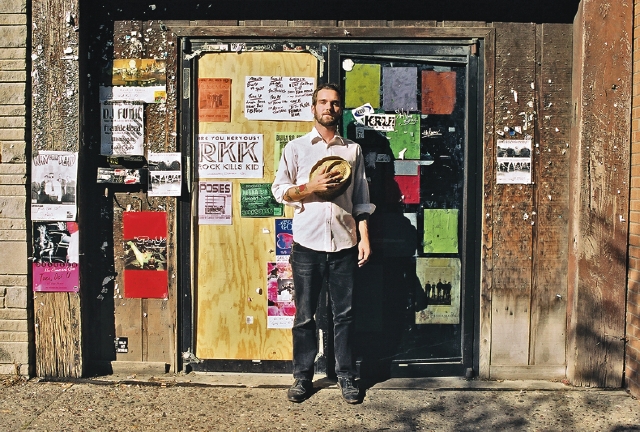“I have to have a certain kind of pen,” says William Elliott Whitmore, guitarist, banjoist, singer and tattooed troubadour. “I can’t have a ballpoint.”“Distilled corn liquor, too, though it’s not a ‘must.’”He’s not dictating a grocery list. Rather, he’s naming two of the three things he likes to have when writing songs. The third is his home, the family farm in rural Iowa near Keokuk (“named after an Indian chief,” he says proudly). The sunbaked, lonesome sound of the rural upper Midwest is apparent on his last three albums, Hymns for the Hopeless , Ashes to Dust and his most recent, 2006’s Songs of the Blackbird . The songs are as dark as the album titles might suggest, with characters that disappear and reappear on each. In other words, this trio of albums is basically a storybook.And now it’s finished. “It’s nice to have a culmination,” he says, speaking by phone from Los Angeles; “it’s a healing thing for me.”“I always thought I’d do these three records and that’d be it. I’d go back and chop firewood. [But] I really got used to making music my career, running around and playing. I like making my living this way. So I thought I’d keep trying to write.”The culmination marks an important period for the 28-year-old songwriter, whose inimitable voice and songwriting are often (and misleadingly) compared to Tom Waits. Whitmore’s songs, whose tones range from dark to darker–a Townes Van Zandt comparison wouldn’t be too far off the mark–have consumed the past three years of his life. So where does he go next?Whitmore doesn’t really know. In conversation, he is disarmingly honest about his future now that the last installation in his trilogy of albums is complete. “Sometimes I think I’ll never write again,” he says. “I think about that shit a lot.”Hence, the need for home, non-ballpoint pens and corn liquor. Helps him stabilize, focus on his future.“It’s hard for me to just sit down, like, here in L.A., and write a song,” he says. “Maybe Dylan could. I’m not that prolific. I kind of have to be home.”Understandable. Though questions about the moonshine remain. Like, for starters: How does he make it?“We use a heating element from a dryer …” he says, trailing off. “It’s kind of hard to explain …”
William Elliott Whitmore opens for Lucero and Rocky Votolato on Sunday, Oct. 22, at the Launchpad. Doors to the all-ages show open at 7 p.m. Advance $10 and $12 tickets available at Natural Sound (plus service fee) and virtuous.com (plus service fee that benefits a local food bank), or at the door the night of the show.









